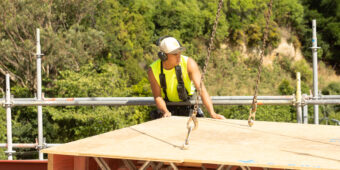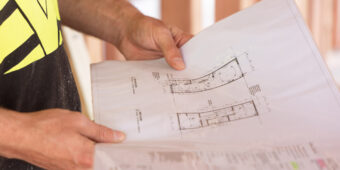BE SMART IN THE SUN
20 Nov 2019, Learn, Prove Your Know How, Safety

Heat, dehydration and fatigue. These three things can bite a tradie over summer and are all closely related. Heat can combine with dehydration and lead to fatigue. Managing how you work in the heat and keeping up your fluid intake can avoid these problems
Dave Crowley, from Palmerston North’s Scafit scaffolding company, says dehydration takes the edge off people and he’s seen it with his team.
“Come the afternoon, because we’ve got a really physical job, dehydration can be a real problem, as it leads to fatigue,” says Dave.
“We had a feeling that some of our minor accidents happening later in the day might be a result of dehydration and fatigue due to a lack of food and water intake.”
To counteract this, Scafit supplies plenty of water and encourages its employees to stay away from sugary and caffeinated energy drinks. The company also provides all-day breakfast with quality cereals and toast to look after the team’s nutrition.
“If the guys aren’t eating properly, they’re certainly not thinking properly,” Dave says.
They even put up pee charts in the toilets, so guys can compare what’s coming out with the optimum colour. Too dark means they need to drink more water.
Knowing the danger signs of too much sun and heat are vital says Jeff Strampel, Health and Safety Lead for Site Safe.
If heat stress or exhaustion is not dealt with quickly, it can progress to heat stroke, which can be life-threatening.
But Jeff explains that even everyday fatigue just makes things harder all round.
“It can be tempting to take on too much work, especially if you’ve been waiting for good weather to get started on a job. Just remember to take a step back and think about the task before you get stuck in. Smart planning makes the job safer.”
Be careful when doing these types of work, which make you more likely to suffer heat exhaustion:
- Working in the direct sun.
- Working near heat-producing processes.
- Working in confined spaces.
- Doing underfloor, ceiling or roof work.
- Sitting in cabs of mobile plant.
- Working in closed areas with limited airflow.
Make sure you know the danger signs to look out for when working in the heat. It might be things you notice in other people, as it can be hard to spot the danger signs in yourself.
Symptoms of over-heating:
- Clammy or sweaty skin.
- Feeling weak or dizzy.
- Dark-coloured urine.
- Pounding or rapid pulse.
- Loss of balance.
- Headaches.
- Muscle cramps.
- Mood changes or confusion.
Then there’s the long-term issue of being exposed to the burning rays of the Kiwi sun.
“Unfortunately, New Zealand has one of the highest melanoma rates in the world,” Jeff says. “Kiwis need to know that exposure to our harsh UV rays can lead to melanoma or other skin cancers.”
Workers who are new to New Zealand may not realise how strong the New Zealand sun is, so it’s important to reiterate it to new employees.
Tips for staying safe
- Be the person with the plan: if you have several jobs to do outside, think about where the sun is and which jobs you might be able to do first to avoid full sun for too long.
- Be cool: wear lightweight, breathable clothing if it’s safe to do so, but be sure to comply with your company’s clothing and PPE regulations. Remember to wear a hat, safety sunglasses and good quality sunblock. With any sunglasses, always check the impact and UV rating.
- Don’t sweat it: stay hydrated with lots of water. Avoid dehydrating drinks containing caffeine or alcohol. People need about eight glasses of water per day, but if you’re working in the heat, it’s likely you will need more.
- Go with the flow: think about airflow and use fans to provide ventilation and keep the temperature down if necessary.
- Take a break: if possible, consider taking a break and heading inside during the hottest part of the day. Have regular breaks and consider extra breaks if the work is demanding. Monitor and place limits around overtime and avoid incentives to work too many hours. If you need to work longer hours, consider staggered start and finish times, and longer breaks and periods off work. Try to set realistic deadlines and timeframes for jobs.
Site Safe is a not-for-profit, membership-based organisation that supports a culture of health and safety in New Zealand construction. For more information go to: www.sitesafe.org.nz
Register to earn LBP Points Sign in
2 Comments
Leave a Reply
You must be logged in to post a comment.




Keep hydrated
drink